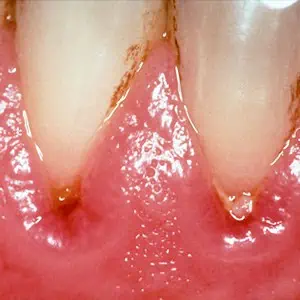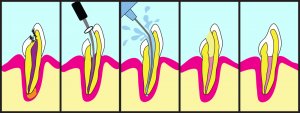So your dentist has recommended you to a specialist, specifically an oral and maxillofacial surgeon. Or maybe you know you need oral surgery but are having trouble finding an oral surgeon near you. Now what?
In this article, we will give you all the basic facts about oral surgery, including:
- How to determine if you need an oral surgeon
- Where to find an oral surgeon
- The procedures an oral surgeon provide
- How much treatments cost
But, if you need to find an oral surgeon in your area, right now — call 866-383-0748. You'll be put through to a live operator, 24/7. They will match you with a nearby oral surgeon according to your exact needs.
Otherwise, let's get started!
In This Article
What is an oral surgeon?
An oral surgeon is a dental specialist trained in particular types of surgery relating to the area around your mouth, head, neck, and jaw. An oral surgeon often requires a referral from your general dentist. A referral can not only cut down on examination costs (as they are generally needed by your insurance provider) but also on time (as an initial examination can be done by your dentist).
Oral surgeons are trained to administer general anesthesia and deep sedation in a hospital or dental office setting.
Oral and maxillofacial surgeon referral
A referral from your dentist to an oral and maxillofacial surgeon is the best way to find a specialist near you and determine if you really do need oral surgery. Some oral surgeons require a referral and others do not, but most insurance policies do require referrals to cover the treatment from an oral surgeon. Make sure to check with your insurance provider and the specific clinic about their insurance policies.

You may be able to schedule a teledentistry appointment, and your online dentist can also make recommendations regarding the next course of action, which may be a referral.
While the specific oral surgeon may not require a referral before treatment, it is extremely important to check with your insurance provider on their requirements to cover the costs of treatment from an oral surgeon.
Some oral and maxillofacial surgeons will make exceptions on their policies for referral in emergency situations, but a referral will always be the best way to go as it helps ensure care before, during, and after the surgery.
What procedures do oral surgeons provide?
Oral surgeons can treat a wide range of ailments affecting your body from the neck up. The most common procedure that you may have heard of is the removal of wisdom teeth, but there is so much more oral surgeons are trained to work with including:
- General tooth removal
- Dental implant surgery
- Reconstructive oral surgery
- Dental infection treatment (much like a periodontist)
- Tooth injury repair
- Jawbone grafting and repair
- Mouth injury repair and treatment
- Facial injury repair and treatment
- Surgery for temporomandibular joint disorders (TMJ)
- Cleft lips and palates surgery
- Facial skin cancer treatment
- Jaw tumors and cyst removal
- Throat cancer treatment
- Dental stem cell banking
Depending on your condition, oral surgeons are able to fix most of your face and mouth issues and provide aftercare treatments, recommendations, and referrals to other specialists if needed. If you suspect that you need an oral surgeon, contact your dentist for a referral and then your local oral surgeon for an appointment, diagnosis, and treatment.
Why do I need oral surgery?
You need oral surgery to keep your teeth where they belong, regulate serious illness, treat hereditary issues, and fix the damage that has occurred from illness or injury. Dental surgeons are a critical piece of the dental healthcare chain. If you have any of the following issues, you will most likely need to seek an oral surgeon near you.
Infection/abscess

A tooth abscess is a pouch of pus that collects when a dental infection destroys tissue. Usually, the abscess will manifest as a painful bump on your gums. An abscess can occur anywhere on your body, not just in the mouth.
It is your body's natural defense system to prevent infection from spreading while your immune system works to destroy the bacteria. There are several different types of tooth abscesses, and not all of them result from periodontal disease.
Gingival Abscess
For some people, this sort of abscess can look like a pimple on the gums. Usually, these result from some kind of external trauma to your gum tissue, like accidentally poking yourself with a toothpick. These abscesses don't usually create too many problems with your mouth health if you keep the area clean to prevent deeper infection.
Periapical Abscess
This kind of abscess may appear on the gum line of the tooth or surrounding tissue when it becomes inflamed. These are usually a result of decay deep inside of your tooth. Once the enamel and dentin of the tooth have eroded, the bacteria invade the nerves and tooth pulp. Wisdom teeth abscesses are a type of periapical abscess that is very common due to how difficult it is to clean the back molars. These types of abscesses are incredibly painful and require an oral surgeon to remove them.
Periodontal Abscess
This type of tooth abscess happens deeper in the gum pockets. The abscess spreads into the surrounding tissue and jaw bone since there is nowhere for it to drain. You will definitely want an oral surgeon to remove these types of abscesses, and quickly, as it can cause further damage to your jawbone, gums, and tooth roots.
Wisdom teeth removal and impacted teeth
Some people would never know they had wisdom teeth if it weren't for dental x-rays. Not everyone will have their wisdom teeth removed, but they need to be removed if:
- They remain completely hidden inside the gums. When wisdom teeth cannot emerge normally, they become impacted (trapped) in your jawbone. Sometimes an impacted wisdom tooth can cause infection and result in cysts that damage the jaw and roots of surrounding teeth.
- They come out of the gums partially. If you have a wisdom tooth peeking out of your gums but doesn't emerge fully, it can create a highway for bacteria to enter your gums through your mouth since the area is so difficult to clean.
- They crowd other teeth. If your wisdom teeth are trying to push your other teeth out of the way, they can damage the surrounding teeth and also cause your teeth to become crooked. Not only are crooked teeth visually unappealing, they can also cause problems with bite alignment and result in other conditions that will require you to find a local oral surgeon.
Tooth removal
Tooth removal may be necessary for a variety of reasons. It's actually a very common procedure because it may be caused by decay, crowding, dental implant surgery, chronic disease, and more. Popular YouTube reviewer, ReviewBrah, shares his oral surgeon review after he had two molars removed. In this video, he shares how the anesthesia affected him and how his entire procedure went:
Bone restructuring
Your jawbone may need restructuring if you have lost teeth and not had them replaced. Our jawbones are preserved through the pressure of chewing and biting. When there are no teeth to chew with, then the body begins to resorb the jawbone. You may also have bone loss in your jaw resulting from periodontal disease and decay. Oral surgeons can treat these conditions with jawbone grafts.
Gum tissue graft
Receding gums are an indicator that there is something amiss in your oral health. It can be a sign of periodontal disease, teeth grinding and clenching, and injury. If you have receding gums, your dentist or dental surgeon may recommend that you have gum graft surgery to help mitigate the damage caused by one of the aforementioned conditions. There are three different types of gum graft surgery:
- Connective tissue graft
- Free gingival graft
- Pedicle (lateral) grafts
Once your gum tissue is damaged, it will not be able to grow back. Gum grafts replace damaged gum tissue with other tissues from elsewhere in your body and improve the health of your mouth as well as the appearance of receding gums. If you suspect that your gums are receding you should find a dental surgeon near you to help diagnose and treat the underlying condition.
Root canal

Root canal treatment removes decay deep inside the tooth by targeting the infection at the roots. Infection in the roots of your teeth can result from untreated tooth decay, crowns or fillings that have faulted in some way, a broken tooth, repetitive dental work on the same tooth, and damage from an accident. A surgical dentist near you can help remedy the pain you feel when you need a root canal almost immediately.
Other oral conditions
Oral surgeons can also remove tumors on the jawbone and those caused by throat cancer, mouth cancer, and other various conditions. They can also remove malignant skin deformities in the face, head, and neck caused by skin cancer. Dental surgeons are also trained to treat mouth ulcers, cysts, and broken jaws or facial bones. In addition to all of these conditions, they are certified to perform surgery and other procedures to remedy hereditary conditions such as cleft palate and lip.
How to find a local oral surgeon
Finding a dental surgeon near you can be a daunting task. Just figuring out if you should be looking for an oral surgeon is hard enough! Figuring out what type of office are you supposed to look for and reading through online reviews of different doctors can be too much.
Because of their advanced training, oral and maxillofacial surgeons are the most qualified professionals to perform procedures like wisdom teeth extraction and dental implant placement, but their expertise goes well beyond teeth.
Oral surgeons can diagnose and treat a host of problems that affect the head, face, neck, and jaw, like reconstructive surgery, bone grafting, and detecting and treating oral cancer.
The education and experience required to become an oral surgeon surpass that of almost any other medical profession. Typical training includes two to four years of undergraduate study in a field like science or mathematics followed by another four years of dental study.
Dr. Marshall Kurtz, Greater Connecticut Oral & Dental Implant Surgery
Luckily, we have the internet, which is full of resources that can help you find who you are looking for in an instant. You can search the American Association of Oral and Maxillofacial Surgeons using your location to find the best oral surgeon near you.
If you prefer to speak with someone on the phone, then call 866-383-0748 any time of day or night to speak to a live operator who will connect you with an oral surgeon in your area.

Oral and maxillofacial surgeon near me
Oral surgeons are trained in not only the mouth but also the surrounding areas. That is why it is usually referred to as oral and maxillofacial surgery. Maxillofacial surgery is any surgical procedure focusing on the reconstruction of the face, oral cavity, head, neck, mouth, and jaws, as well as facial cosmetic surgeries.
So basically, if it involves the bones and muscles from the neck up, then a maxillofacial and oral surgeon is who you need to see. Dentists who perform facial reconstruction are also often prosthodontists, so you may want to read about finding a prosthodontist near you as well.
Emergency oral surgeon near me
When your pain is too great to wait for the morning, you may need to find an emergency dentist near you. Dental emergencies are not bound by business hours so it's important to know your options.
An emergency oral surgeon will not only help you in your time of dire need but also instruct you on how to prevent future dental emergencies.
Pediatric oral surgeon near me
The pediatric population often needs the skills of an oral surgeon. Pediatric oral and maxillofacial surgery is a specialty within the group of oral surgeons. Your child may need a pediatric oral surgeon near you if they have broken their jaw or have any other problems relating to the bony and soft tissues in their mouth.
Progressed gum disease and trauma from an accident could require reconstructive surgery from a pediatric oral surgeon. To find one near you it would be best to first consult your pediatric dentist or your nearest dental school. You can also call 866-383-0748 to find someone in your area.
What to expect when you visit an oral surgeon
When you visit your oral surgeon's office, there are several steps that will come before your actual surgery. Your treatment plan will vary depending on your condition, so make sure to consult with your surgeon directly about what aftercare and recovery time will be necessary for you. Oral surgery is not just another trip to your dentist—it is usually far more invasive.
Before surgery
To prepare for your surgery, your doctor will need to get your full medical and dental history from you, as well as a list of all your medications. An x-ray will be taken to assess the best way to remove any teeth.
You may be given specific instructions regarding your regular medications or instructed to fast before your procedure depending on what needs to be done. You might also need to take antibiotics before your surgery.
Day of procedure
Just before your treatment, your oral surgeon will numb the area that will be worked on with local anesthetic. You may be given general anesthesia, a type of dental sedation, depending on the intensity of the procedure.
If you are awake for the procedure, it is very common to feel a lot of pressure and rocking if any of your teeth need removal. You shouldn't feel any pain at all, just pressure. If you feel any pain, make sure to notify your surgeon immediately so that they can administer more numbing agents.
If any extraction is needed, then your surgeon may need to make an incision in your gums, which will require stitches after the procedure is completed.
Aftercare

After your treatment, you may be asked to bite down on a piece of gauze. The pressure of your bite will help to clot the blood at the extraction site. Bleeding is extremely common for about 24 hours after surgery. Make sure to take all medications as prescribed and recommended to manage pain and prevent infection and inflammation.
Your oral surgeon will give you instructions on how to change your eating and drinking habits to help with healing as well as instructions for brushing and cleaning your mouth.
Cost of oral surgery near me
The cost of visiting an oral surgeon near you is completely dependent on the type of surgery you require. Below is a table of common treatments and their prices.
Procedure | Cost |
Dental implants (full mouth) | $40,000 + |
Dental implants (single tooth) | $1,500 - $6,000 |
Sinus lift | $1,000 - $5,000 |
Tooth extraction | $75 - $250 |
Surgical tooth extraction | $180 - $550 |
Wisdom tooth extraction | $120 - $800 |
Gum graft | $600 - $1,200 |
Jawbone graft | $250 - $3,000 (depending on material) |
Should I see an oral surgeon near me now?
You should see an oral surgeon near you now if your general dentist has recommended it, but just because you have mouth pain doesn't mean you need an oral surgeon. If you have oral cancer, missing teeth, severe tooth pain, progressed periodontal disease, or wisdom teeth needing removal, then you may also want to seek the help of an oral surgeon.
How to find a dental surgeon near me
Finding a dental surgeon in your area may be as simple as asking your general dentist for a recommendation or referral. They themselves may offer the services you need. Otherwise, you can call 866-383-0748. You'll be put through to a live operator, 24/7, who will match you with a nearby dentist according to your exact needs.
Conclusion
Finding an oral surgeon near you might seem like a difficult task, but we hope that after reading this article you are able to see just how easy the process can be. Oral surgeons are specialists who focus on any surgical procedure from the neck up. Finding an oral surgeon in an emergency situation can be done by finding an emergency dentist in your area.
You can call 866-383-0748 to be connected with a live operator 24/7 who will match you with an oral surgeon in your area. Before you go to an oral surgeon, check with your dentist to make sure that it is really necessary and to find the right treatment options for you.
FAQ
Do I need a referral for an oral surgeon?
An oral surgeon often requires a referral. Most insurance policies require a referral to cover the costs of treatment, so it's important to check with your insurance provider before taking any action.
How can I find an oral surgeon near me?
You can find an oral surgeon near you by searching the AAOMS website by location to find the best oral surgeon near you or call 866-383-0748 to be connected with someone who can help you find an oral surgeon in your area.
What is an oral surgeon?
An oral surgeon is a dental specialist trained in surgery relating to the area around your mouth, head, neck, and jaw. Oral and maxillofacial surgeons train for several years after dental school.
How do I know if I need an oral surgeon?
Check with your dentist first, but if you require surgery to remove a tooth, implant a new tooth, graft jawbone or gum tissue, or remove your wisdom teeth, then an oral surgeon may be what you need.
Mayo Clinic: Oral and Maxillofacial Surgery. Consulted 15 August, 2020.
MyOMS: Do I need an oral surgery referral? Consulted 27, August, 2020.




